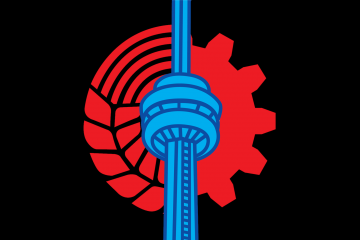After months of consultation, deputations, and debate, Olivia Chow has passed her first budget as Mayor. While Chow was able to successfully staunch the bleeding on city services, temporarily slowing the absolute decline of the basic functions of the city working people rely on, it comes at the cost of political capitulation to the corporate class by giving huge increases to police, and forcing working people to foot the bill.
The new budget, approved by council on February 14th, marks the culmination of a return to a more participatory budget process, which previous administrations, bolstered by a series of increasing “strong mayor powers,” had done away with. This meant a return of broader public consultation in the form of town halls, surveys, consultation meetings, and forums alongside the usual deputations.
The consultations were centred around the dire budget crisis facing the city, with the Mayor framing it as the public’s opportunity to highlight what they wanted to prioritize funding for, and what they wanted deprioritized. Working people in Toronto were clear: it was time to fund services in the city which would ease the burden of the cost-living-crisis that was strangling them. Overwhelmingly, city residents also made clear where the city could cut funds: the Toronto Police Services budget.
Some of the public consultations had an impact, with both drafts and the final budget presenting no major cuts to services. This isn’t to say there weren’t cuts made to services in-kind during the budget process, with standards reduced for services like the TTC and wheel trans, and departments across the city closing positions it has had left unfilled for some time. Service levels for the TTC also still remain woefully below pre-pandemic levels, and won’t be restored for some time.
Further, the budget itself nonetheless amounts to kicking the can even further down the road on state-of-good-repair investments desperately needed across the city. As anyone who has ridden the TTC recently can attest, another track derailment, like the one which permanently decommissioned the SRT, hangs like the shadow of the axe on rides across the city every day as Line 2 cars similarly reach the end of their lifecycle, and SOGR on certain segments of track is in critical disrepair. This has led to track delays, and on-time performance standards dropping across TTC services.
The housing crisis is also reaching new lows,with the current budget and Mayor’s policies being entirely inadequate to address the problem. In February, it was announced that the city is covering for its lack of shelter spaces by housing the unhoused on city buses parked outside of a subway station. The waitlist for subsidized, affordable housing in Toronto is at 14 years for a one-bedroom unit as of 2022. While the budget expands some supports for tenants who may be evicted, these programs ultimately give landlords public money as a band-aid solution to the crisis.
Olivia Chow’s plan to build housing in the city, which has been adopted by council, includes the construction of 65,000 affordable housing units by 2031. This would be a good start if it was all rent-geared-to-income social housing. However, the City itself has only agreed to build 25,000 of these units with only a fraction of this smaller number being subsidized housing. With 80,000 households on the waitlist for subsidized social housing, this plan ensures that housing in the city will remain unaffordable and corporate landlords will continue to extract billions of dollars from working people. Instead, we need a comprehensive social housing program that treats housing as a public utility and delivers it according to need.
Where did the money go then, if not to invest in the critical services Torontonians are clamouring for like the TTCand housing? It seems, as is often the case, that council decided those most in need were the Toronto Police Services, whom they have awarded one of the largest dollar increases in the city’s history – over 30% more than the controversial $48m increase handed over by Tory in his final budget as Mayor.
In addition to the generous new funding provided to the police by Council, an expansion of police powers is coming to Toronto. A new system of management and monitoring of rallies and protests will be developed, with advanced powers given to the police to restrict working people’s right to protest. In a chilling sign of what is to come, the motion’s mover, Councillor James Pasternak, cited not only the recent protests against the genocide of the Palestinians, but specifically cited a rally of healthcare unions in the city as being the motivating factor for his submission of the motion. The motion passed after some debate, with Mayor Olivia Chow breaking from the centre-left block in council to cast the deciding vote in favour.
These giveaways to the police and to the right on council mirror the political compromises Chow has already made in her short tenure, like her sell-out of Ontario Place to the Ford government’s mega-spa plan for some short term funding from the province. This time, it was to ensure there would be popular support for her 9.5% property tax hike increase to fund her budget.
Ultimately however, the historic 9.5% increase already resembled a give-away to the right wing and corporate powers which dominate the city. Like the municipal sales tax proposed last fall, property taxes are a regressive form of taxation which adds pressure to the boot on the neck of working people struggling to breathe amidst a historic cost-of-living crisis.
Instead of focusing on orienting the growing centre-left bloc toward democratic control of the city and it’s services, looking to end and even clawback the turns toward privatization which have occurred in the city since amalgamation, Chow’s administration is focusing on end-delivery of services at any cost – and no matter who pays.
This social democratic approach to governance will alienate working people, and ultimately empowers the right while delivering the policies they advocate for on policing, and keeps cash flowing to corporations. Cracks in Chow’s base are already beginning to show, as support has weakened in the polls, and some of her most vocal advocates have turned their back on her.
The Toronto Committee of the Communist Party reiterates its long standing call to develop a democratic civic reform movement, which is led by the labour movement and integrates the people’s movements engaged in a struggle for civic reform which builds a city for working people.
In addition the Communist Party of Canada reiterates its calls for:
A New Financial Deal For Cities
• Call on the provincial government to adequately fund municipalities through needs-based grants or by providing wealth taxing powers to cities.
• Reduce property taxes by 50 percent, including by removing the $2.2 billion education levy and by uploading the costs for transit, public health, housing and social assistance.
• Eliminate all development fees, which are simply passed on to tenants and home buyers in the form of higher rents and prices.
Real Police Reform
• Reduce the police budget by 50% and demilitarize police units.
• Expand programs that de-task police from mental health crisis calls and create communityled crisis response teams.
• Establish strong civilian control over the police through a completely independent civilian agency with powers to fire, hire and discipline, that is publicly accountable and transparent.
Real Action on the Housing Crisis
• Eliminate wait lists for social housing by building 80,000 units of rent-geared-to-income (RGI) social housing units; repair existing social housing stock.
• Provide sufficient and safe shelters for unhoused people and stop encampment evictions.
• Push the provincial government to roll back rental costs to 20 percent of income, implement real rent controls and scrap vacancy decontrol.
• Expand and improve transitional, supportive and long-term housing to women and children fleeing domestic abuse.


